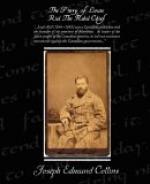Louis Riel the elder was in due time blessed with a son, the same about whom it is our painful duty to write this little book. Estimating at its fullest the value of education, the father was keenly anxious for an opportunity to send Louis fils to a school; but fortune had not been liberal with him in later years, though the sweat was constantly upon his brow, and his good wife’s fingers were never still. This son had unusual precocity, and strangers who looked upon him used to say that a great fire slumbered in his eye. He was bright, quick and piquant; and it is said that it was impossible to know the lad and not be pleased with his person and manners. One important eye had observed him many a time; and this was the great ecclesiastical dignitary of Red River, Monseigneur Tache. He conceived a strong affection for the lad and resolved to secure for him a sound education. His own purse was limited, but there was a lady whom he knew upon whose bounty he could count. I give the following extract, which I translate from M. Tasse’s book, and I write it in italics that it may be the more clearly impressed upon the reader’s mind when he comes to peruse the first story of blood which shall be related: The father’s resources did not permit him to undertake the expense of this education, but His Grace Archbishop Tache having been struck with the intellectual precocity of Louis, found a generous protector of proverbial munificence for him in the person of Madame Masson, of Terrebonne. In later years it was reserved to the same bishop to go out as a mediator between Government and a band of rebels which had at its head a man whose hands were reddened with the blood of a settler. This rebel and murderer was the same lad upon whom the bishop had lavished his affection and his interest.
Louis, the elder, was travelling upon the plain, when he met his son, bound for the civilized East, to enter upon his studies. He had pride in the lad, and said to his companions that one day he knew he would have occasion to glory in him. They said good-bye, the father seasoning the parting with wholesome words of advice, the son with filial submission receiving them, and storing them away in his heart. This was their last parting, and their last speaking. Before the son had been long at his studies he learned that his father was dead. His nature was deeply affectionate, and the painful intelligence overwhelmed him for many days. At school he was not distinguished for brilliancy, but his tutors observed that he had solid parts, and much intellectual subtlety. He was not a great favourite among his class-mates generally, because his manners were shy and reserved, and he shrank from, rather than courted, the popularity and leadership which are the darling aims of so many lads in their school-days. Yet he had many friends who were warmly attached to him; and to these he returned an equal affection. One of his comrades was stricken down with a loathsome and fatal malady, and all his




